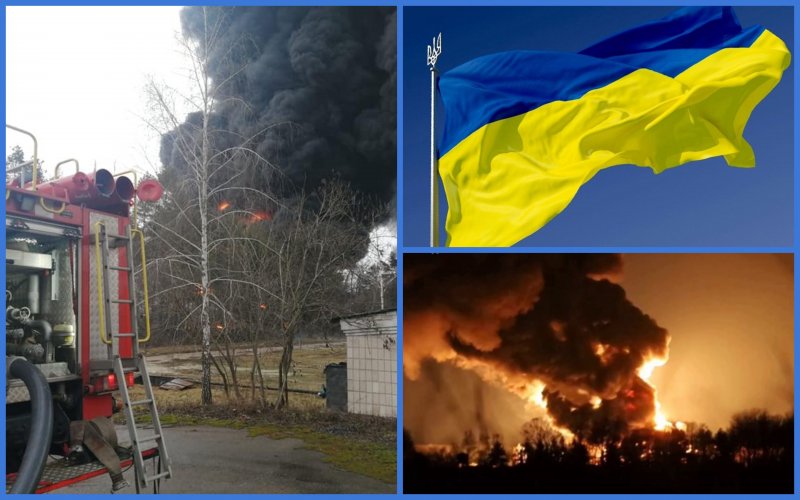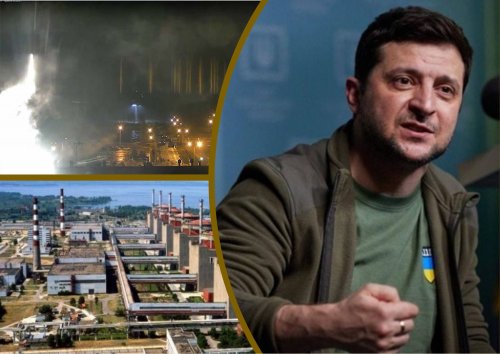The War is a disaster not just for people, but also for the environment. As a result of hostilities, air, water, soil become infected, flora and fauna are destroyed. There are also risks of damage to especially dangerous objects: chemical industry enterprises, nuclear power plants and other structures, which can lead to massive pollution of large areas. The environment is invisible victim of war.
Therefore, in EcoPolitica, we analyzed what consequences Russian aggression has already brought to our nature and what to expect next.
The damage to the environment from hostilities is always quite large. From the explosions of shells and bombs, the relief is disturbed, soils collapse and subside, large areas of arable land are disabled, areas are flooded, and the natural habitat of individual populations is destroyed. Chemical compounds contained in ammunition pollute the air and water.
In the area of active battles, soils are massively polluted with fuels, metal fragments from shells and mines, as well as depleted uranium, which is used to increase the armor-piercing ability of some ammunition. These soils may be unsuitable for agriculture for a long time.
Forests are also affected by the fighting. As a result of hitting enemy shells, there is a high risk of forest fires. In this case, it is quite difficult to quickly extinguish the fire, so such fires can spread uncontrollably and destroy significant areas of the forest ecosystem.
The war in Ukraine is a catastrophe for the whole continent, says Lyudmyla Tsyganok, president of the Professional Association of Ecologists of Ukraine. From the point of view of the environment, there is no local war, because the consequences of even the slightest military action extend to the whole world and have an extremely harmful effect on the health and life of humanity.
“Today, the Russian occupation forces are destroying infrastructure in Ukraine, upsetting the ecological balance,” says Tsyganok. Destruction of infrastructure associated with water supply and drainage, chemical pollution, disconnection from electricity of facilities discharging wastewater pose a threat to water resources, but also to the ecosystem as a whole."
Speaking of the damage to dangerous objects, on February 26, an enemy missile already hit an oil depot in the village of Kryachki, Vasilkovsky community, Kiev region. Ruslan Strelets, Acting Minister for the Protection of the Environment and Natura, said that the damage to the environment from this strike amounted to approximately UAH 810 billion.
On March 3, in Chernihiv, during shelling on the territory of the Astra Combine, a shell hit an oil depot. As a result, a tank group of 3 thousand cubic meters caught fire diesel fuel.
“The most dangerous things in such man-made disasters is the ingress of harmful substances into the soil and groundwater,” - explains Tsyganok. Usually, a significant excess of the content of carcinogenic substances is recorded, which threaten the health of residents of settlements located near the epicenter. It is necessary to check the water in the wells, because there is a possibility that dirt will go into the groundwater.
But damage to nuclear generation poses a particular danger to the environment. On February 24, the invaders entered the exclusion zone and seized the Chernobyl nuclear power plant. Due to their activities, on February 27, researchers recorded a significant excess of the absorbed dose, the press center of the Exclusion Zone reports.
“Ukraine losted control over the ARMS system (automatic system for monitoring the radiation situation). The latest data obtained indicate a seven-fold excess of the absorbed dose on the sensor near the radioactive waste storage facilities Vector, Podlesny, Third Stage and Buryakovka. This indicates the incorrect use of security systems by the occupiers and their lack of the necessary expertise to protect nuclear facilities."
Protected areas are also seriously affected by hostilities. Natural complexes, for which human intervention is not desirable, can become a place for the passage of troops, heavy equipment, or even experience direct strikes. In addition, because of hostilities, protected areas may be cut off from the supply of everything necessary. Now such a fate has befallen the largest steppe reserve in Europe - "Askania-Nova". As the director of the park Viktor Shapoval told EcoPolitica, they were occupied from the first hours. Although military operations didn’t affect the territory, it is not easy to establish work in such conditions:
"The park is offline, in resource austerity mode. All procurement procedures have been disrupted. There is an urgent problem with concentrated feed. Volunteers are helping with funds. Now we are trying to master them - to buy grain from local farmers," — Shapoval said.
The spring of this year, instead of rebirth, brought massive destruction to our nature, the consequences of which we will be able to assess only with time. In general, the environment has no concept of boundaries, the entire ecological system is interconnected. Therefore, the war is not only harmful to Ukrainian nature, but its consequences will also be felt by other countries, our close and distant neighbors for many years to come.


